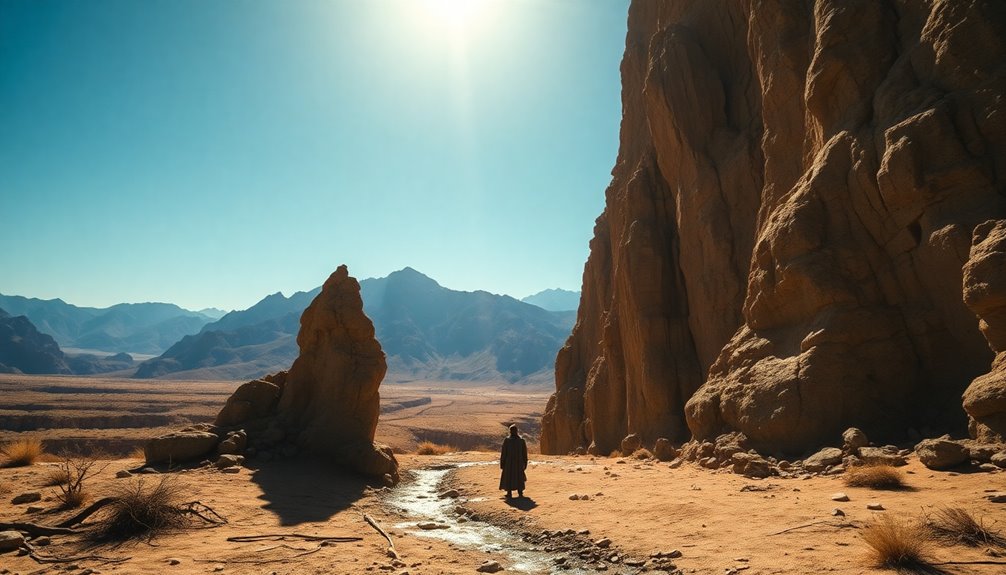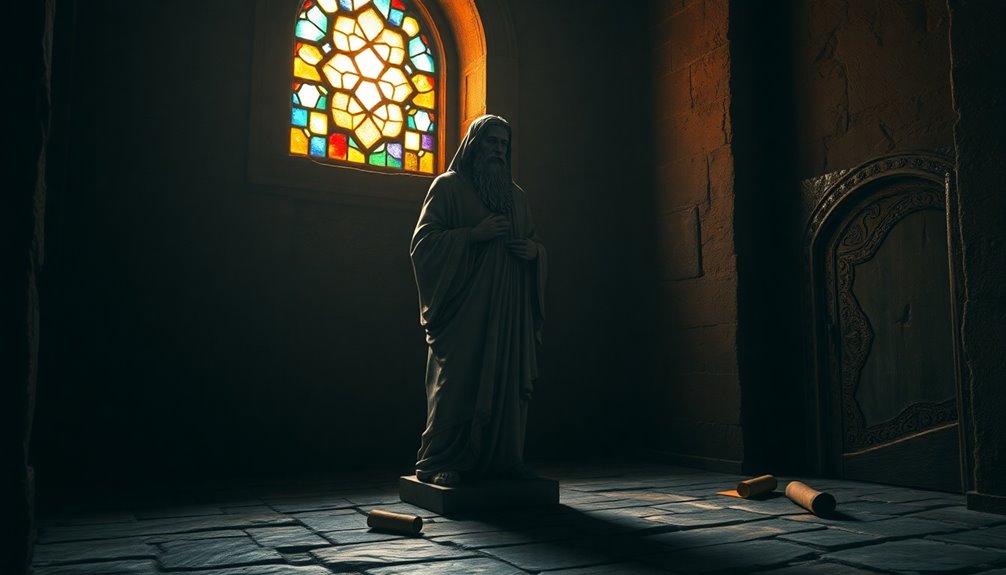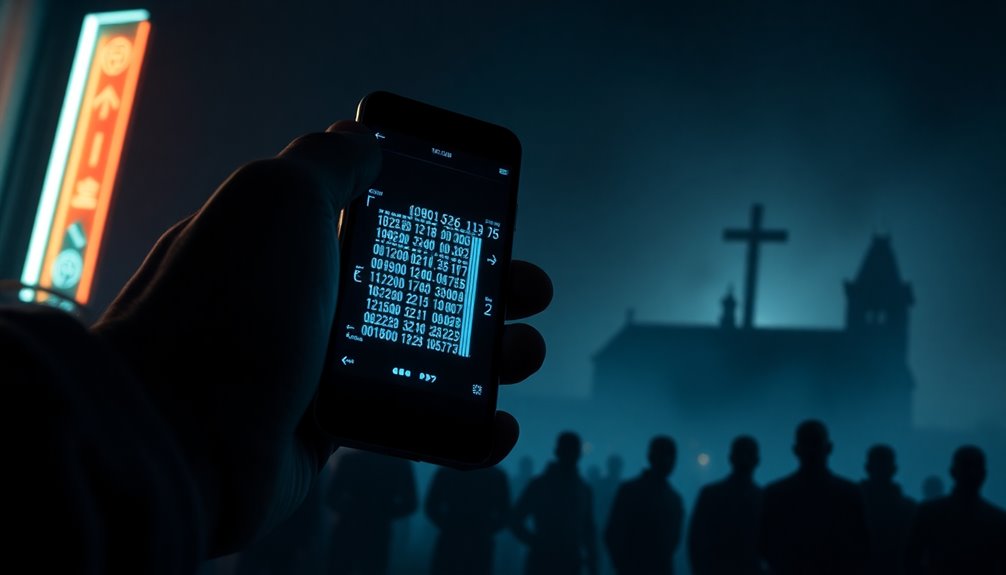Moses didn't enter the Promised Land because of his disobedience at Meribah. When the Israelites needed water, God instructed him to speak to the rock. Instead, Moses struck it, showing a lack of trust in God's command and misrepresenting His holiness. This error led to God's judgment, declaring that Moses wouldn't enter the land despite his leadership and dedication. God did allow him to see the Promised Land from Mount Nebo, highlighting the complexities of divine mercy and justice. If you're curious about more lessons from Moses' journey and their implications, there's plenty more to explore.
Key Takeaways
- Moses struck the rock at Meribah instead of speaking to it, disobeying God's command (Numbers 20:10-12).
- This act misrepresented God's holiness to the Israelites, undermining their trust in Him.
- As a consequence of his disobedience, God decreed that Moses would not enter the Promised Land (Deuteronomy 3:26-27).
- Moses' failure to honor God during a critical moment demonstrated the high standards expected of spiritual leaders.
- Despite this judgment, Moses was allowed to view the Promised Land from Mount Nebo, reflecting divine mercy (Deuteronomy 34:4-5).
Introduction

Moses stands as one of the most significant figures in biblical history, yet his journey took an unexpected turn when he was barred from entering the Promised Land. This pivotal moment stems from an incident at Meribah Kadesh, where Moses acted in disobedience. Instead of speaking to the rock as God commanded, he struck it, misrepresenting God's holiness to the Israelites (Numbers 20:10-12). This act demonstrated a lack of trust in God's instructions, leading to God's decree that Moses wouldn't lead the Israelites into Canaan.
The backdrop of this event highlights a recurring theme: the struggle between the Israelites' immediate needs and their trust in God. Complaining about a lack of water, they tested Moses and God's patience (Numbers 20:1-5).
Despite the consequences, God allowed Moses to view the Promised Land from Mount Nebo, reaffirming His promise to the descendants of Abraham, Isaac, and Jacob (Deuteronomy 34:1-4).
Moses' exclusion serves as a profound lesson about the importance of obedience and trust in God, particularly for leaders guiding others in faith. Understanding this moment deepens your appreciation for the complexities of leadership and divine expectations.
Divine Judgment on Disobedience

When you examine Moses' story, you'll see how serious disobedience can be in the eyes of God.
His act of striking the rock instead of speaking to it serves as a stark reminder of the consequences of not fully following divine commands.
Let's look closely at the primary and secondary references that illustrate this divine judgment and its lasting impact.
Primary Bible References
Why did Moses face divine judgment despite his leadership and dedication? The answer lies in his disobedience at Meribah, where he struck the rock instead of speaking to it as God commanded (Numbers 20:10-12). This act misrepresented God's instructions and led Moses to take credit for the miracle of providing water, which emphasized the importance of upholding God's holiness before the Israelites.
God's judgment was clear and uncompromising; He declared that Moses wouldn't enter the Promised Land due to this failure (Deuteronomy 3:26-27). This consequence illustrates that even the most revered leaders aren't exempt from divine accountability. Through Moses' actions, God conveyed a lesson about the critical nature of complete obedience to His commands (Deuteronomy 32:51-52).
Despite this punishment, God still showed compassion. He allowed Moses to view the Promised Land from Mount Nebo before his death, reaffirming the promises made to the patriarchs (Deuteronomy 34:4-5).
This balance of justice and mercy highlights the depth of God's relationship with His people and reinforces the seriousness of disobedience, even for a leader like Moses.
Secondary Bible References
Throughout Scripture, divine judgment on disobedience serves as a powerful reminder of the consequences that can arise from failing to follow God's commands. In Numbers 20:10-12, we see how Moses, despite his leadership, faced exclusion from the Promised Land due to his disobedience. When God commanded him to speak to the rock, he struck it instead, demonstrating a lack of trust and obedience. This act didn't just impact Moses; it served as a lesson to the Israelites about the seriousness of adhering to divine authority.
God's judgment on Moses highlighted the need for leaders to uphold His holiness, as outlined in Deuteronomy 32:51-52. His failure to obey not only brought personal consequences but also reflected on the entire community he led. It underscores the biblical principle that leaders bear significant accountability for their actions.
Even though Moses faced this judgment, his legacy remained significant, as seen when he appears with Christ during the Transfiguration (Matthew 17:1-3). This enduring impact shows that, while disobedience has consequences, God's grace can still honor faithful leadership in other ways.
Moses' Leadership in Egypt

Moses' leadership in Egypt was marked by his unwavering commitment to freeing the Israelites from slavery. Chosen by God, you see him boldly confronting Pharaoh, demanding the release of his people. His persistence leads to dramatic miracles, including the plagues that ultimately persuade Pharaoh to let the Israelites go. This pivotal moment sets the stage for the Exodus, showcasing Moses' crucial role in this monumental journey.
As a leader, Moses not only guided the Israelites out of Egypt but also received the Law from God on Mount Sinai. This included the Ten Commandments, which established the moral and ethical framework for the Israelites as they prepared to enter the Promised Land. His faith and obedience shine through significant events, like the parting of the Red Sea, where you witness his deep trust in God's power.
Throughout this journey, Moses serves as a mediator between God and the Israelites, interceding on their behalf and navigating through the challenges of the wilderness. His leadership exemplifies dedication, courage, and a profound connection with God, shaping the identity of the Israelites as they move toward their promised destiny.
Moses' Failure to Honor God

Despite his remarkable leadership and unwavering faith, a significant failure marked Moses' journey—his failure to honor God during a critical moment in the wilderness. In Numbers 20:8, God commanded Moses to speak to the rock to bring forth water, but in a moment of frustration with the Israelites, Moses struck the rock instead. This act of disobedience not only demonstrated a lack of trust in God's instructions but also misrepresented God's holiness before the people.
When Moses chose to disobey, he failed to uphold the reverence and honor God deserved. As a result, God's judgment was clear: Moses wouldn't enter the Promised Land (Deuteronomy 32:51-52).
This incident serves as a profound reminder of the high standards expected of leaders, highlighting the seriousness of complete obedience to God's commands. Despite all his contributions, this failure to honor God had dire consequences, emphasizing the weight of accountability in spiritual leadership.
Moses' experience teaches you that even the most faithful leaders must remain vigilant in honoring God, as the repercussions of disobedience can be life-altering.
Moses' Actions at Meribah

At Meribah, you see how Moses misunderstood God's command to speak to the rock, choosing instead to strike it in frustration.
This misinterpretation not only misrepresented God's provision but also had serious consequences for his leadership.
Understanding this incident sheds light on the importance of obedience and clarity in following divine instructions.
Misunderstanding the Rock Incident
When God commanded Moses to speak to the rock at Meribah, it was meant to be a moment of faith and obedience, but instead, anger took over. In his frustration with the Israelites, Moses struck the rock twice, acting in disobedience to God's clear instruction (Numbers 20:8-11).
This wasn't just a minor error; it misrepresented God's provision and distorted the symbolism of the rock, which represents Christ (1 Corinthians 10:4).
By choosing to strike rather than speak, Moses failed to uphold God's holiness and trust in His command, leading to serious repercussions (Numbers 20:12). His actions showed a lack of faith, undermining the very message God wanted to convey to the people.
This incident highlighted that even leaders can falter under pressure, allowing their emotions to cloud their judgment.
As a result of this disobedience, God decreed that Moses wouldn't lead the Israelites into the Promised Land (Deuteronomy 32:51-52). This serves as a powerful reminder of the consequences of failing to follow God's directives, especially for those in positions of leadership.
Misinterpretation of God's Command
Moses' actions at Meribah illustrate a critical misinterpretation of God's command that not only affected his leadership but also had profound implications for the Israelites.
Instead of speaking to the rock as God instructed, Moses struck the rock out of frustration, ultimately disobeying God's specific command (Numbers 20:8).
This misinterpretation led to a distorted representation of God's holiness and power, undermining the trust the people had in Him (Numbers 20:10-12).
Trusting God in Challenges

When you're faced with challenges, trusting God's timing becomes crucial.
Just like Moses, you might feel pressure from those around you, but it's essential to lead with faith and not frustration.
Trust in God's Timing
Trusting in God's timing can be incredibly challenging, especially during moments of frustration and uncertainty. You may find yourself facing situations that test your patience, much like Moses did when he was instructed to speak to the rock for water. Instead of fully trusting God's timing and methods, Moses let his anger and impatience cloud his judgment.
This disobedience not only cost him entry into the Promised Land but also misrepresented God's holiness to the people. Moses' experience serves as a vital lesson in the importance of complete obedience to God's commands.
Even the most faithful leaders can falter when they don't trust God's plans. When challenges arise, it's crucial to remember that partial obedience can lead to serious consequences. You might feel overwhelmed by the trials you're facing, but it's during these moments that your faith in God's timing is put to the test.
Take inspiration from Moses' journey and strive to maintain your trust in God's perfect timing. Recognize that challenges are opportunities to deepen your faith and obedience, ensuring that you're aligned with God's purpose for your life.
Community Trust in Leadership
Leadership is often put to the test during challenging times, and community trust plays a crucial role in navigating these difficulties. When the Israelites faced a water shortage at Meribah, their lack of trust in God placed immense pressure on Moses. This incident highlighted how community disobedience can directly influence a leader's actions and decisions. Instead of fully obeying God's commands to speak to the rock, Moses struck it in frustration, misrepresenting God's holiness to the people.
Your trust in leadership is vital, especially during trials. When a community collectively doubts, it can erode a leader's resolve, leading to consequences that affect everyone. Moses' moment of disobedience serves as a powerful reminder of the importance of maintaining trust and obedience. His failure to uphold God's commands not only impacted his journey but also demonstrated the ripple effect of leadership choices on the community's faith.
In challenging times, remember that trusting God strengthens both leaders and followers. By supporting and believing in God's guidance, you foster a community that can weather adversity together, ensuring that leadership remains aligned with divine intentions.
Moses' Leadership Lessons Emphasized

Although Moses is often celebrated as a great leader, his journey serves as a powerful reminder of the critical importance of obedience to God's commands. When Moses struck the rock at Meribah, his actions stemmed from frustration and misrepresented God's holiness, showcasing how a leader's emotional state can impact decision-making. This disobedience resulted in severe consequences—being barred from entering the Promised Land.
Moses' experience emphasizes that leadership isn't just about making decisions; it's about maintaining trust in God's instructions. Partial obedience can lead to significant setbacks, reinforcing that even revered leaders must remain accountable for their actions. His story illustrates that trust in God's plan is paramount, and faithfulness is rewarded, even when mistakes occur.
Despite his exclusion, Moses maintained a close relationship with God, highlighting the coexistence of mercy and human failure. This teaches us that leaders can falter, yet their bond with the divine can remain intact.
Ultimately, Moses' legacy underscores the need for unwavering obedience, accountability, and trust in God, serving as a vital lesson for all who aspire to lead.
Additional Resources

As you explore the story of Moses and his exclusion from the Promised Land, you might find it helpful to delve deeper into various resources that expand on these themes. The Bible, particularly the books of Numbers and Deuteronomy, provides a direct account of Moses' disobedience at Meribah Kadesh, where he struck the rock instead of following what God commanded.
This incident reveals the high stakes of leadership, demonstrating how one man's actions can impact an entire community—in this case, the Israelites.
You might also consider theological commentaries that analyze the balance of divine mercy and justice in Moses' life. These resources can illuminate how Moses' legacy continues to influence religious thought, emphasizing the importance of complete obedience to God's commands.
Books and articles that discuss the implications of leadership in faith contexts can further enhance your understanding. They reveal how Moses' inability to enter the Promised Land serves as a cautionary tale about the responsibilities that come with leadership and the potential consequences of disobedience.
Frequently Asked Questions
Why Were Moses Not Allowed to Go to the Promised Land?
You might wonder why Moses wasn't allowed to go to the Promised Land. His exclusion stemmed from a significant act of disobedience at Meribah, where he struck a rock in frustration instead of speaking to it as God commanded.
This action misrepresented God's holiness to the Israelites. As a leader, you'd see that such accountability highlights the importance of obedience to God's directives in fulfilling your responsibilities effectively.
Why Was Moses Never to Be Allowed in the Promised Land Quizlet?
You might wonder why Moses was never allowed in the Promised Land, and it boils down to his actions at Meribah.
When he struck the rock instead of speaking to it, he disobeyed God's command. This act demonstrated a lack of trust and failure to honor God's holiness.
Despite his leadership and dedication, this moment of disobedience had serious consequences, showing how crucial it's to follow God's instructions completely.
Did Moses Go to Heaven in the Bible?
In the Bible, it's not explicitly stated that Moses went to heaven.
Instead, you read that he died in Moab and was buried by God in an unknown location. While he glimpsed the Promised Land from Mount Nebo, his afterlife remains a topic of debate among theologians.
Some traditions suggest he holds a special place in the heavenly realm, as seen during the Transfiguration of Jesus, highlighting his lasting significance.
Why Was Aaron Not Allowed to Enter the Promised Land?
Aaron wasn't allowed to enter the Promised Land because of his disobedience during the incident at Meribah. He and Moses failed to honor God's command to speak to the rock, instead striking it.
This act of unfaithfulness had serious consequences; God declared that Aaron would die before entering the land. His death on Mount Hor marked a significant transition in Israel's leadership, emphasizing the importance of accountability in spiritual roles.










